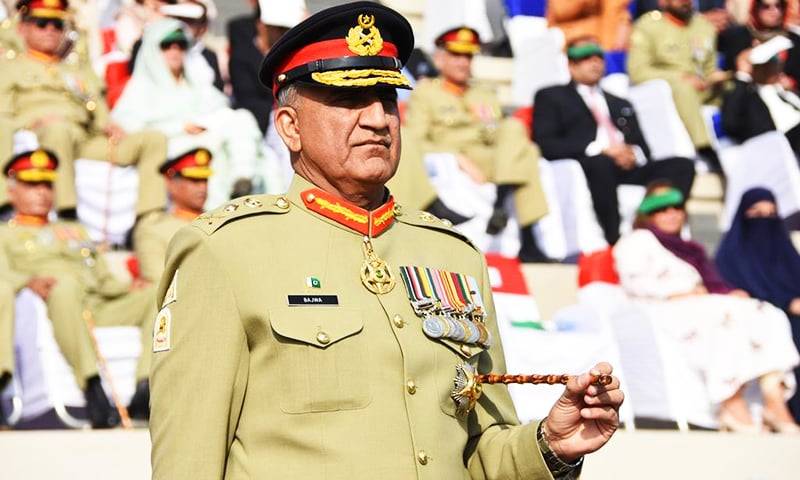Chief of Army Staff General Qamar Bajwa Friday contacted the top US commander in Afghanistan, said a military spokesman, hours after a suicide bomber blew himself within the premises of a shrine in Sehwan Sharif.
In his telephonic conversation with General John Nicholson, commander of the Resolute Support Mission in Afghanistan, General Bajwa “expressed his concerns over continued acts of terrorism in Pakistan with impunity from Afghanistan”.
#COAS telephoned US Gen John Nicholson, Comd RSM Afg. "RSM to play its role to stop use of Afghan soil for terrorist attacks in Pak" #COAS. pic.twitter.com/7hP0HYJqZ3
— Maj Gen Asif Ghafoor (@OfficialDGISPR) February 17, 2017
“Most of the incidents in Pakistan are claimed by terrorist organisations with leadership hiding in Afghanistan,” said ISPR Director General Maj-Gen Asif Ghafoor in a statement.
General Bajwa, said the military spokesman, conveyed to the US commander that “inaction” on part of Kabul against terrorist safe havens is “testing our current policy of cross border restraint”.
Over 100 ‘militants’ killed
The military spokesman said at least 100 alleged militants had been killed and “sizeable” arms and ammunition were recovered in the past 24 hours.
“The intelligence agencies are making progress to unearth networks behind the recent terrorism incidents,” the military spokesman said in a statement issued to the media.
IBOs and combining ops across the country including Punjab. Over 100 Ts killed besides sizeable apprehensions during last 24 hours. pic.twitter.com/hVrzRFTSrr
— Maj Gen Asif Ghafoor (@OfficialDGISPR) February 17, 2017
“Intelligence-based and combing operations are in progress across the country including Punjab.”
During the conversation with Nicholson, General Bajwa also informed him of the list of terrorists handed over to Afghan authorities earlier today.
“Afghan authorities have been given list of 76 terrorists who are supporting terrorist activities in Pakistan. Afghan government has been asked to target them/hand them over to Pakistan.”
Nationwide crackdown
Authorities launched a nationwide security crackdown Friday, officials said, after the blast killed at least 83 people, including 20 children, and wounded hundreds.
Police had cordoned off the shrine of Lal Shahbaz Qalandar, a 13th century Muslim saint, early Friday as forensic investigators reached the town of Sehwan in Sindh, some 200 kilometres (124 miles) northeast of financial hub Karachi.
The centuries-old shrine's white floor was still smeared with blood, with scattered debris including shoes, shawls, and baby bottles. At least 20 children are believed to be among the dead, the head of Sehwan's medical facility Moeen Uddin Siddiqui said.
At 3:30am the shrine's caretaker stood among the carnage and defiantly rang its bell, a daily ritual that he vowed to continue, telling AFP he will "not bow down to terrorists".
The Islamic State group (IS) has claimed the attack, which came after a series of bloody extremist assaults this week, including a powerful Taliban suicide bomb in Lahore which killed 13 people and wounded dozens.
The attacks have dented growing optimism in security after Pakistan's decade-long war on militancy.
Military spokesman Asif Ghafoor said the attacks had been carried out from sanctuaries in Afghanistan and that Kabul had been asked to take action.
He also said the military had "closed" the porous border between the two countries where Kabul and Islamabad have long accused each other of harbouring extremists.
“Scores of suspects have been arrested from different cities in a pre-dawn crackdown,” a government official speaking anonymously told AFP.
Security officials said at least 18 terrorists had been killed in Sindh overnight, and 13 more in the northwest.
The provincial government announced three days of mourning as Pakistanis vented their grief and fury on social media.
Sufism, a mystic Islamic order that believes in living saints, worships through music and is viewed as heretical by some hardline groups.
The Islamic State group has targeted Sufi shrines in Pakistan previously, killing more than 50 at a shrine in Balochistan last year.






